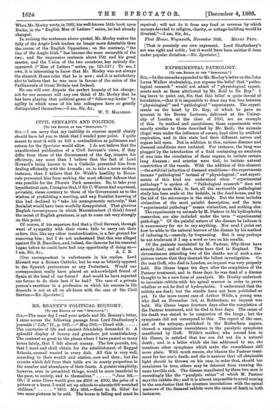CIVIL SERVANTS AND POLITICS.
[To THE EDITOR OP THE " SPECTATOR:1
Sin,—I am sorry that my inability to express myself clearly should have led you to think that I evaded your point. I quite meant to meet it with as full a contradiction as politeness and esteem for the Spectator would allow. I do not believe that the unauthorised publication of a Civil Servant's views, if they differ from those of the Government of the day, impairs his efficiency, any more than I believe that the fact of Lord Howard's being known to be a Catholic prevented him from dealing efficiently with the Armada ; or, to take a more modern instance, than I believe that Dr. Webb's hostility to Home- rule prevented him from making the most efficient defence that was possible for the Phcenix Park assassins. So, to take your hypothetical case, I imagine that, if Sir C. Warren had expressed, privately, views contrary to those of the Government as to the wisdom of prohibiting a meeting, and any Socialist knowing of this had declined to "take his arrangements seriously," that Socialist would have been woefully disappointed. That glorious English inconsequence in which Montalembert (I think) found the secret of English greatness, is apt to come out very strongly on this point.
Of course, if his superiors find that a Civil Servant, through want of sympathy with their views, fails to carry out their orders, this, like any other insubordination, is a fair ground for removing him ; but I do not understand that this was alleged against Sir R. Hamilton, and, indeed, the clamour for his removal began before he could have had any opportunity of doing so.— [Our correspondent is unfortunate in his replies. Lord Howard was a Roman Catholic, but he was as bitterly opposed to the Spanish pretensions as any Protestant. Would our correspondent really have placed an acknowledged friend of Spain at the head of our forces P And would he have expected our forces to do their best if he had ? The case of a private person's exertions in a profession on which his success in life depends is not at all on all-fours with the case of the Civil Service.—En. Spectator.]






































 Previous page
Previous page